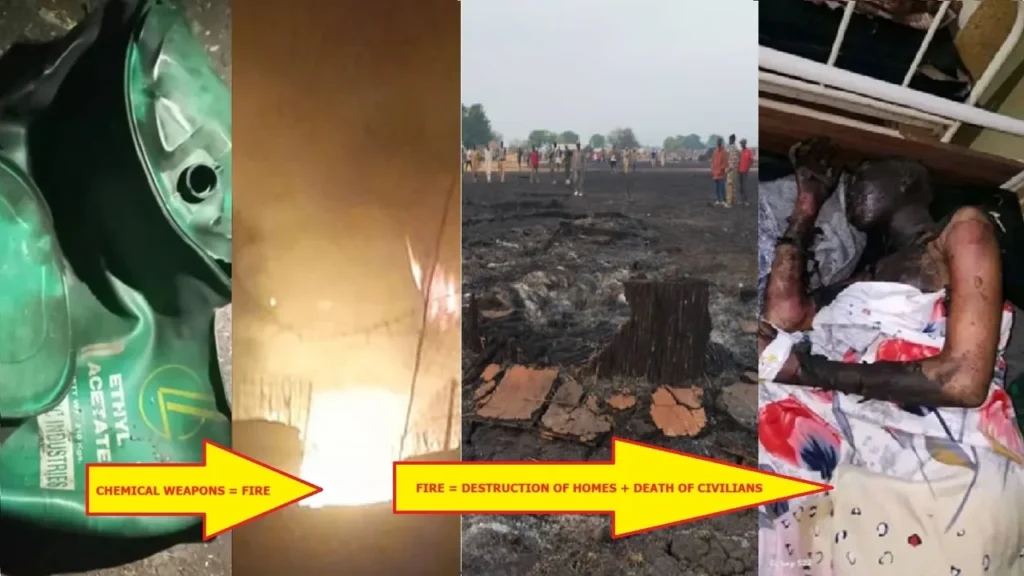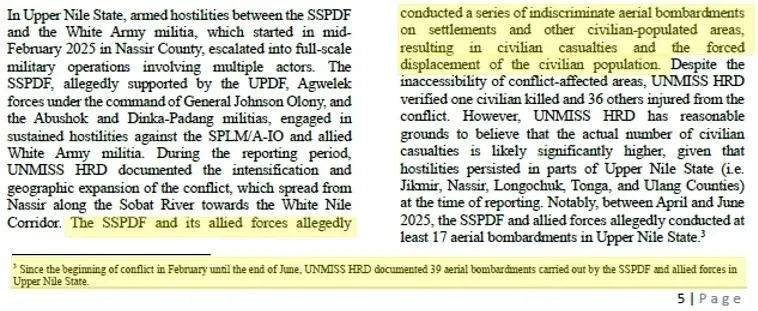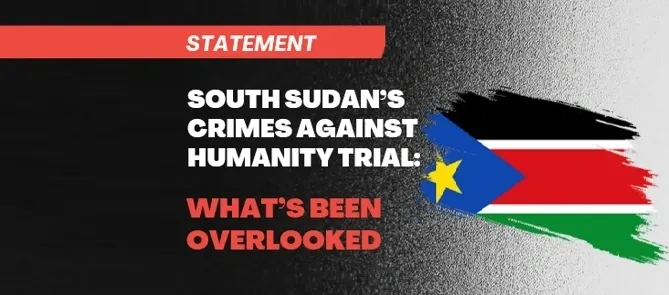As the Director of World Without War, I feel it is important to highlight both the positive and the negative implications of the decision by the Government of South Sudan to seek justice for the war crimes and crimes against humanity committed during the violence in Nasir earlier this year.
Many concerned individuals and organizations have focused only on the problematic nature of the court itself, and the potential for the trial of several high-ranking members of South Sudan’s political and military establishments—most notably the First Vice President, Dr. Riek Machar Teny—to escalate existing tensions and raise the risk that the Revitalised Agreement on the Resolution of the Conflict in the Republic of South Sudan (R-ARCSS) will break down and that South Sudan will be again plunged into a disastrous civil war.
These are real and very troubling issues, to which I will return in this statement—but only after acknowledging what has previously gone unsaid—that the Government’s unprecedented actions do have an important and laudable significance.
This is the first time in the history of South Sudan that the Government has acknowledged that war crimes and crimes against humanity have been committed by armed members of military and para-military organizations operating under the direction of responsible political and uniformed military leaders, with their acts—which included “gross violations of the Geneva Conventions and international humanitarian law, including the desecration of corpses, persecution of civilians and attacks on humanitarian workers,” according to South Sudan’s Justice Minister Joseph Geng Akech. Among the acts allegedly committed were summary executions of surrendered military personnel, the murder of civilians, and the destruction of public property.
It is likewise a notable and positive sign that the Government has stated that not even members of the nation’s highest executive bodies are immune from prosecution in such matters. Note: the presiding judge in the case, James Alala is correct in saying that Machar does not enjoy immunity, but wrong in saying that President Salva Kiir does have immunity from prosecution for such crimes; heads of state have previously been charged—and convicted—of such crimes in the past; notable cases include:
- Slobodan Milošević
- Charles Taylor,
- Muammar Gaddafi,
- Omar al-Bashir
Nonetheless, Judge Alala’s misapprehension re: Presidential immunity aside, official acknowledgment of the commission of war crimes and crimes against humanity—not as an isolated battlefield aberration but as systematic violence incited, organized, funded and directed by high-level politicians and military leaders—is extremely rare and when it does happen, it is almost universally a post-facto statement by a successor government. In less than five percent of the cases which I have studied has such an admission come from the government in power when and where the crimes occurred—notably the 2023 report of the Ethiopian Human Rights Commission on the horrific crimes committed by all parties to the conflict in the Tigray, Afar and Amhara regions of Ethiopia between November 2020 and June 2021.
Thus, the Government of South Sudan should be commended for taking this historic first step towards accountability for the war crimes and crimes against humanity which have taken place within its borders, and which have been suffered by too many of its people since the founding of the nation in 2011.
That said, I concur with what other interested organizations—including the United Nations, Human Rights Watch, and Amnesty International, have already stated—that trials of such a serious nature must be fair, transparent and public; that they should bear no taint of politicization—and that the accused must have their own rights to due process protected and the rule of law must be observed.
Moreover, I will go further still and note that ALL victims of the violence in Nasir and the surrounding areas of Upper Nile State deserve to see justice done on their behalf, and this includes the 30 civilians—most of them women and children—killed by a series of indiscriminate airstrikes, where the use of chemical and incendiary weapons in the form of “barrel bombs” resulted in gruesome deaths, severe burn injuries and civilian homes burned to the ground.

The absence of those airstrikes in the list of indictments, and the absence of the officers who ordered those strikes and carried them out in the ranks of the defendants make it clear that this is a matter which should be referred to a court specifically designed to adjudicate such crimes; it is a role for just such a body as the Hybrid Court for South Sudan is meant to be; or alternatively for a standing body such as the ICC or an ad hoc tribunal such as the International Criminal Tribunals for Rwanda and the former Yugoslavia. Note: those airstrikes are just some of the 39 such aerial bombardments documented by the UNMISS Human Rights Division in the first half of 2025.

Therefore, I join my voice to the many others from the international community, civil society, and humanitarian sector who have called upon the government of South Sudan to defer this matter to the Hybrid Court for South Sudan and to do its part to accelerate the formation of this long-overdue judiciary body which is one of the many key elements of the R-ARCSS which has not yet been implemented—or to request that the UN Security Council either act under Chapter VII of the UN Charter to refer the matter to the ICC or to convene an ad hoc tribunal (as was done in the cases of Rwanda and the former Yugoslavia) to consider this case and any others in which credible allegations of war crimes and crimes against humanity can be made.
By transferring the adjudication of this matter to a more appropriate authority, the Government—to include its senior Opposition members—could turn their attention more fully toward dealing with the current economic and humanitarian crises in which South Sudan is currently mired; they could work toward securing an arrangement to guarantee the sale and shipment of its oil in such a way that national income streams are stabilized without lending continued financial support to the parties of the civil war in Sudan—or seeing those funds cut off as by pipeline attacks and national embargoes, like those which have cost South Sudan billions of dollars of lost revenues over the last two years.
And there are ways to do this—one approach which would bring South Sudan not just national-level oil revenue, but the raw materials to both pave roads and fuel transport along them are modular refineries—like the one built in Bentiu in 2021—which would also create much-needed jobs in construction, transportation, and industrial sectors. Such refineries could transform the problematic Dar Blend crude oil into diesel to supply the national and regional markets, and asphalt to pave the nation’s roads.
Within two years, new refineries near Bor and Juba could be processing 10,000 barrels of oil a day for regional sale, with large solar farms powering Juba’s grid and solar micro-grids in state capitals providing clean energy for household use. But international support for such infrastructure and other trade-based solutions would only be made possibly by a stable security environment—and that is unlikely to happen if this trial continues to distract South Sudan’s transitional government of national unity from the serious business of fully implementing the R-ARCSS.
Our analytical models suggest that if the current deterioration of political stability continues, there is a 50 percent chance that war will break out again before the end of November – rising to greater than 80 percent in December and January—and this assessment has been confirmed as accurately reflecting the situation on the ground by the ‘early warning system’ of the Community Empowerment for Progress Organization, one of South Sudan’s foremost civil society advocacy groups.
Therefore, I urge the following—
That the Government of South Sudan remand the matter of the violence in Nasir to a more appropriate authority, and in so doing, expand its scope to consider ALL grave violations of International Humanitarian Law committed in Upper Nile State between February and April of 2025—and that they use the urgency of this case to accelerate the formation of the Hybrid Court for South Sudan, deferring this case until that court is formed; or that they request the UN Security Council act to convene a special tribunal to handle this case and others like it or to refer these matters to the ICC for investigation and adjudication;
That the UN Security Council and the ICC Prosecutor lend their technical assistance to helping South Sudan’s Ministry of Justice to pursue either the immediate formation of the Hybrid Court or a referral to the ICC or a special tribunal; or that, if they see no action by the Government of South Sudan to pursue a more proper venue for this case, that the ICC Prosecutor will initiate an investigation proprio motu and that the Security Council will consider acting under Chapter VII to convene a special tribunal for these matters;
That the President of the United States take a personal interest in this matter, as given his much-proclaimed desire to be recognized as an architect of international peace and his personal interest in “the art of the deal,” President Trump has a golden opportunity to preserve peace in South Sudan by leveraging the power of the very agency he created during his first term as President – the U.S. International Development Finance Corporation (DFC) whose role is to mobilize private capital for development in emerging markets that advance U.S. foreign policy and national security interests, and whose portfolio includes energy, agribusiness, and health—the very sorts of areas where mutually beneficial opportunities exist for major U.S. businesses in South Sudan; confident that President Trump will make it clear that loans, equity and credit insurance under the DFC would be tied to the immediate implementation of the Hybrid Court for South Sudan and security sector reforms, particularly the deployment of the Necessary Unified Forces to the most conflict-prone areas of South Sudan;
That the People’s Republic of China offer highly favorable terms to restart and fast-track the rehabilitation of the Juba International Airport and construction of the Juba-Rumbek road and then extend it to Wau, Bentiu, and Malakal, contingent on resolution of the current crisis, and the implementation of the necessary financial, judicial and security sector reforms needed to ensure on-going stability and to address the current project arrears, and to offer to build the kind of modular oil refineries, industrial solar farms, and regional hydro-power infrastructure for which it is uniquely positioned to finance through the good offices of the Export–Import Bank of China and the China Development Bank;
That the European Union freeze all remaining Multiannual Indicative Programme (MIP) funds for South Sudan until its government takes meaningful steps to implement the Hybrid Court, implement security sector reforms, and rebuild public trust;
That the International Monetary Fund freeze disbursements of existing International Development Association (IDA) grants pending resolution of the current political crisis, and set explicit benchmarks for security sector and judicial reforms required by the R-ARCSS as milestones to release future IDA21 funds, and consider conditioning the accelerated release of additional grants on early achievement of those milestones;
—and that all of South Sudan’s friends and neighbors, all of its international and regional partners, all relevant agencies and missions of the United Nations and all interested non-governmental, business, religious and civil society organizations immediately extend their best offers of technical and financial support to swiftly and safely implement the required judicial, administrative, financial and security sector reforms, contingent on and in support of a genuine commitment by South Sudan’s transitional government to come together in the spirit of the unity embodied in the signatures of President Salva Kiir, First Vice President Dr. Riek Machar and the seven other distinguished South Sudanese politicians and civil society members on that document—and in the memory of Dr. John Garang and the hundreds of thousands of other South Sudanese patriots who gave their lives in hopes that their friends and family would one day live in peace, security and prosperity in a free and united South Sudan.
World Without War condemns all violations of international humanitarian law. We believe that it is absurd to speak of ‘war crimes.’ The real crime is war. Hence, our organization – founded by Lt. Col. Edward H. Carpenter, a former US Marine and UN peacekeeper – calls for the abolition of war, and we work to dispel enduring myths about “just wars” and that old lie – Dulce et Decorum Est.
We also believe that transparency is the key to accountability – and that accountability is the way to achieve positive change. If you have additional information regarding these attacks – or any other crimes against humanity, cover-ups, or acts of corruption, please contact us. Whatever you share will be kept confidential – unless you want it to be attributed – but we WILL act upon it.
For 29 years, Lt. Col. Edward H. Carpenter worked in the US Military, with assignments in Afghanistan, Saudi Arabia, Indonesia, Kuwait, Bahrain, and Japan. I had the honor of serving as a member of the Chief of Naval Operations Strategic Studies Group, as a military professor at the Daniel K. Inouye Asia-Pacific Center for Security Studies, and as the Commanding Officer of Marine Aviation Logistics Squadron 26.
On his final tour of duty in 2019, he was seconded to the United Nations as a peacekeeper, responsible for the protection of civilians in the world’s youngest nation – and one of its most dangerous. His year in South Sudan was the setting for the best and worst days in a career that has spanned three decades, two wars, and five continents.




